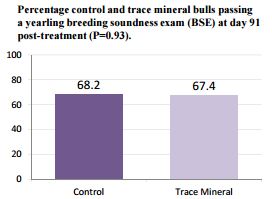



Trace Mineral Injections Did Not Improve Sperm Quality
Sperm quality of yearling bulls was not improved by injectable trace minerals, according to a Kansas State University study.Neither did it improve the chances of passing a breeding soundness examination.
Objective
Determine if using an injectable trace mineral product in developing beef bulls, in addition to dietary mineral supplementation, improves semen quality and ability to pass a yearling breeding soundness examination.
Study Design
Nine-month-old bulls (n = 90) were injected intravenously with 1 mL/100 lb body weight of an injectable trace mineral product (Multimin 90; Multimin USA, Fort Collins, CO) containing zinc, copper, selenium, and manganese (trace mineral), or a saline placebo (control). Blood was collected at 0, 8, and 24 hours after injection.
Semen was collected and breeding soundness examinations were performed on days 42 and 91 after injection.
Blood and semen were evaluated for trace mineral concentrations, and semen was evaluated for sperm characteristics. Body weights and scrotal circumferences also were measured.
Results
Bulls treated with the trace mineral product had elevated blood mineral concentrations at 8 hours post-injection.
At 24 hours post-injection, Cu and Zn had returned to levels comparable to control bulls, whereas Se and Mn remained elevated compared with bulls in the control treatment.
Sperm characteristics did not differ between treatments at either 42 or 91 days posttreatment, although on day 42 bulls treated with the trace mineral tended to have greater sperm concentrations in semen.
Bulls from the control and trace mineral treatments also did not differ in their ability to pass a yearling breeding soundness exam at 91 days.



